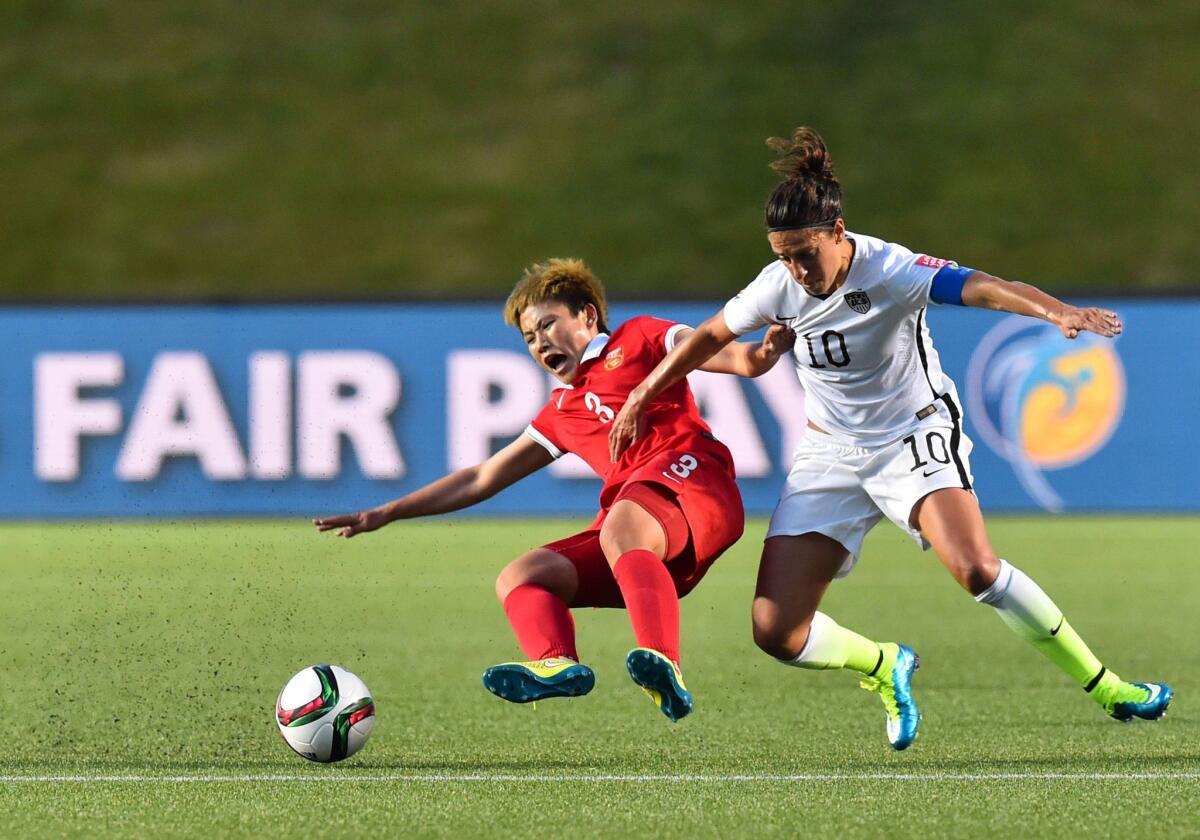U.S. womenâs soccer team says execution, not game plan, changed

U.S. captain Carli Lloyd (10) tries to get around Chinaâs Li Jiayue to gain possession of the ball in the second half of a Womenâs World Cup quarterfinal.
Reporting from Montreal â The ineffective performance of the U.S. attack throughout most of this Womenâs World Cup has left Coach Jill Ellis defending herself against criticism her game plans are outdated and predictable.
Then came Fridayâs quarterfinal, a 1-0 win over China, in which the Americans turned in their best performance of the tournament. Afterward Ellis said the strategy hadnât changed â but the execution had.
âItâs not like suddenly this is a different game plan,â she said. âKeeping possession, change of point, tempo â all these things are stressed in every game. Because at this level all those things, all those components, are important to be successful.
âThis team steps up in big moments. And they recognized we needed to step up. It wasnât anything different than theyâve been directed to do before.â
Ellis did make one change that proved important. With regular midfielders Megan Rapinoe and Lauren Holiday suspended with two yellow cards, Ellis used Morgan Brian as a holding player in what essentially became a diamond midfield. That freed Carli Lloyd to spend more time orchestrating the attack and she responded, pushing deeper into the offensive end and scoring the gameâs only goal in the 51st minute.
âI defended more than Iâve ever defended,â Brian said. âAnd it worked.â
Abby Wambach, playing in her fourth World Cup under her fourth coach, came to Ellisâ defense after Fridayâs game, saying the fact the U.S. is unbeaten and in the semifinals is proof Ellisâ strategies have been successful.
âOur coaching staff, they make good decisions. And I trust their [decisions],â she said. âTheyâre purposeful. Itâs really important that they stick to their plan because their plan has been working.â
Refs deserve a red card
Wambach played just four minutes off the bench in the quarterfinal, but she almost didnât get that.
FIFA considered suspending her for comments she made about French referee Stephanie Frappart, who gave Rapinoe and Holiday the cautions that got them suspended.
Wambach quickly apologized and FIFA let her off with only a warning. But that doesnât change the fact that her larger point was right: the officiating in this tournament has been unworthy of a World Cup.
Frappart was correct in handing the yellows to the two Americans â Rapinoeâs was for an accumulation of fouls and some apparent back talk to the official â as she was for awarding two penalty kicks to the U.S. in the same game.
But New Zealand was burned by two poor calls in group play, including a hand-ball call that led to its elimination from the tournament. And Canada won its opener on a stoppage-time penalty kick awarded by Ukrainian referee Kateryna Monzul for a dubious foul.
In the biggest game of the tournament, Germanyâs quarterfinal win over France, Canadian referee Carol Anne Chenard seemed unable to keep up with the action, once even failing to get out of the way of a French free kick.
She also missed two calls on Germanyâs Anja Mittag â the first an apparent hand ball and the second a late studs-up tackle that earned only a caution â then awarded Germany the penalty kick that tied the game by calling Franceâs Amel Majri for a hand ball. (That call appeared defendable though it was close.)
The inconsistent officiating here has focused new attention on a 16-year-old FIFA rule that mandates only female officials can work the Womenâs World Cup. The intent of the rule is laudable: Create opportunities for female officials to gain experience and grow.
But until there are enough quality referees to meet demand â the World Cup started with 22 referees, 44 assistant referees and seven support referees from 48 nations â perhaps FIFA should simply settle for the best referees, regardless of gender.







